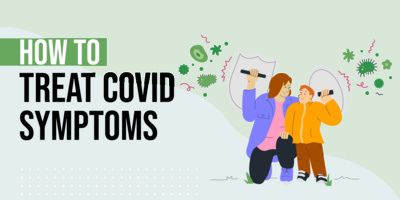
How to Treat COVID Symptoms
2024 will mark the fourth year of living in a world with COVID-19. Thankfully, more is known about this virus...
Read moreHelp patients book appointments with you on Solv. It's free!
20 instant-book locations







Help patients book appointments with you on Solv. It's free!
The shingles vaccine can help reduce your risk of getting shingles and related complications, such as long-term nerve discomfort. Knowing more about this vaccine and what it can do for you and your family will help you make better health decisions for yourself and your family.
Shingles is a painful, blistering skin rash caused by the varicella-zoster virus. According to the National Library of Medicine, the varicella-zoster virus is the same virus that causes chickenpox (NLM).
Your body goes into dormancy once you've experienced chickenpox. According to the National Library of Medicine, the chickenpox virus can reactivate and produce shingles if it does so several years later.
According to the National Library of Medicine, people over 60 who had chickenpox before the age of 12 months are most likely to develop shingles. You may be more susceptible to shingles if your immune system has been weakened by illness or medicines.
According to the National Library of Medicine, the main symptom of shingles is a painful skin rash that starts on the spine and wraps around to the front of the chest or abdomen. Some people may develop rashes around their eyes, lips, and ears, according to the National Library of Medicine.
Before rashes appear, pain, tingling, and burning on one side of the body are common symptoms, according to the National Library of Medicine. Following these feelings, red skin patches and little blisters appear, which rupture open to form small, dry, crusty sores. Shingles sores usually heal in two to three weeks with no scarring.
According to the National Library of Medicine, other shingles symptoms include:
The varicella-zoster virus reactivates in your body after you've had chickenpox, resulting in shingles. According to the CDC, you cannot receive shingles from someone else who has it. Chickenpox can, however, be contracted from someone who has shingles, increasing your chances of developing shingles later.
According to the National Library of Medicine, no one knows why the varicella-zoster virus suddenly becomes active again years later. According to the findings, many people who had mild cases of chickenpox are unaware they even had the virus in the first place.
Two doses of the Shingrix shingles vaccination can prevent shingles. The Shingrix vaccine, according to the CDC, can also reduce your risk of shingles complications. According to the business, this shingles shot, which is given in the upper arm, is more than 90% effective in preventing shingles in people 50 and older with a good immune system.
The CDC recommends shingles immunization for adults aged 50 and up, as well as those aged 19 and up, who have compromised immune systems as a result of disease or pharmaceutical therapy. It also recommends having the shingles vaccination if you've had shingles and/or chickenpox in the past, as well as if you've had another shingles vaccine called Zostavax, which is no longer available in the United States.
The shingles vaccine, according to the CDC, can induce temporary side effects that make it difficult to accomplish ordinary tasks for two to three days.
The following are some of the possible shingles vaccine side effects:
According to the CDC, side effects are more common in younger people, and you may have a reaction to the shingles injection after both doses. It is recommended that you take over-the-counter pain medicines such as ibuprofen or acetaminophen if you experience side effects after getting the shingles vaccine.
According to the CDC, another possible side effect of the shingles vaccine is Guillain-Barré syndrome (GBS). GBS is a rare but dangerous illness in which your immune system targets the peripheral neurological system, which controls the nerves in your brain and spinal cord, according to the National Library of Medicine.
According to the CDC, you should only get the shingles vaccine if you are at least 19 years old and have a weakened immune system due to disease or medications used to treat a disease if you are under 50 years old and have a weakened immune system due to disease or medications used to treat a disease. Consult your health-care professional if you have any concerns.
The shingles vaccine is covered by most Medicare prescription drug plans, such as Part D, but not by Medicare Part A (Hospital Insurance) or Medicare Part B, according to Medicare.gov (Medical Insurance). Your health insurance plan may or may not cover the shingles vaccine, depending on the type of policy you have. To see if the shingles vaccine is covered under your plan, contact Medicare or your health insurance provider.
In general, shingles vaccines will be available at Bethany-area urgent care centers, retail clinics, primary care doctor offices and local pharmacies. While walk-in appointments are typically available, booking a visit online will reduce your wait time and ensure you protect yourself from shingles faster.
Regardless of the kind of vaccination you are seeking, Solv can help you book an appointment. Simply search for Bethany-area doctors, find a provider, and book the most convenient time for you. Be sure to include “shingles vaccine” or “vaccine consultation” as your reason for visit, and bring any relevant travel plans and previous immunization records.
Same-day and next-day appointments for shingles vaccines or consultations can easily be booked directly through Solv. Simply search for Bethany-area doctors, find a provider, and book an appointment as soon as today.
Solv gathers reviews, ratings, and other data on Bethany-area vaccination specialists to ensure the clinics provided meet our standards. Search for a shingles vaccine provider, see what previous patients think, and book an appointment with a top-rated doctor today!
You should get the shingles vaccine if you are at high risk for getting it or if you are experiencing symptoms. It is recommended that individuals 60 and older get the shingles vaccine, as this is when the risk of contraction is high. Even if you have previously contracted shingles, you should get the vaccine to prevent or mitigate future cases. The shingles vaccine is not recommended by the CDC for anyone younger than 60 because it has not yet been thoroughly studied in those age groups.
Without insurance, a shingles vaccine and the consultation generally preceding it can cost anywhere from $200 to $250.
All Medicare part D and most private health insurance plans cover the shingles vaccine. Typically, you will have to cover a co-payment for the consultation and, in some cases, the vaccine itself.
The shingles vaccine, according to the CDC, is 97 percent effective in preventing shingles in people aged 50 to 69 who have a strong immune system, and 91 percent effective in people aged 70 and up who have a weak immune system. It goes on to claim that in people with weakened immune systems, the shingles vaccine is 68 percent to 91 percent effective in preventing shingles. According to the CDC, the Shingrix vaccine is 91 percent effective in preventing long-term nerve damage from shingles in people 50 years and older, and 89 percent effective in adults 70 years and older.
The CDC recommends that people over 50 receive just two doses of the shingles vaccination, separated by two to six months. Adults aged 19 and above with a weakened immune system should have a second dose of the shingles vaccine one to two months after the first.
According to the CDC, shingles is a contagious virus that only infects those who have already had chickenpox. The CDC recommends getting the shingles vaccination even if you've already had chickenpox.

Updated on Mar 25, 2024
Solv has strict sourcing guidelines and relies on peer-reviewed studies, academic research institutions, and medical associations. We avoid using tertiary references.
Annual Wellness Exam in Bethany
Chickenpox Vaccine in Bethany
DOT Exam in Bethany
Ear Wax Removal in Bethany
Eye Exam in Bethany
Flu Shot in Bethany
Hepatitis Vaccine in Bethany
Measles Vaccine (MMR) in Bethany
Pap Smear in Bethany
Physical Exam in Bethany
Shingles Vaccine in Bethany
Sinus Infection Treatment in Bethany
Sports Physicals in Bethany
Tetanus Shot in Bethany
Typhoid Vaccine in Bethany
Well-Woman Exam in Bethany
Yellow Fever Vaccine in Bethany
A1C Test in Bethany
Allergy Testing in Bethany
Basic Metabolic Panel in Bethany
Blood Test in Bethany
CMP Test in Bethany
COVID-19 Antibody Test in Bethany
Chlamydia Test in Bethany
Cholesterol Test in Bethany
Flu Test in Bethany
Food Allergy Testing in Bethany
Glucose Test in Bethany
Hepatitis test in Bethany
Mono Test in Bethany
RSV Test in Bethany
STD Testing in Bethany
Strep Test in Bethany
TB Test in Bethany
Trichomonas Test in Bethany
Tips, advice, news—your resource to stay healthy and safe while improving your experience with healthcare providers when you need them.